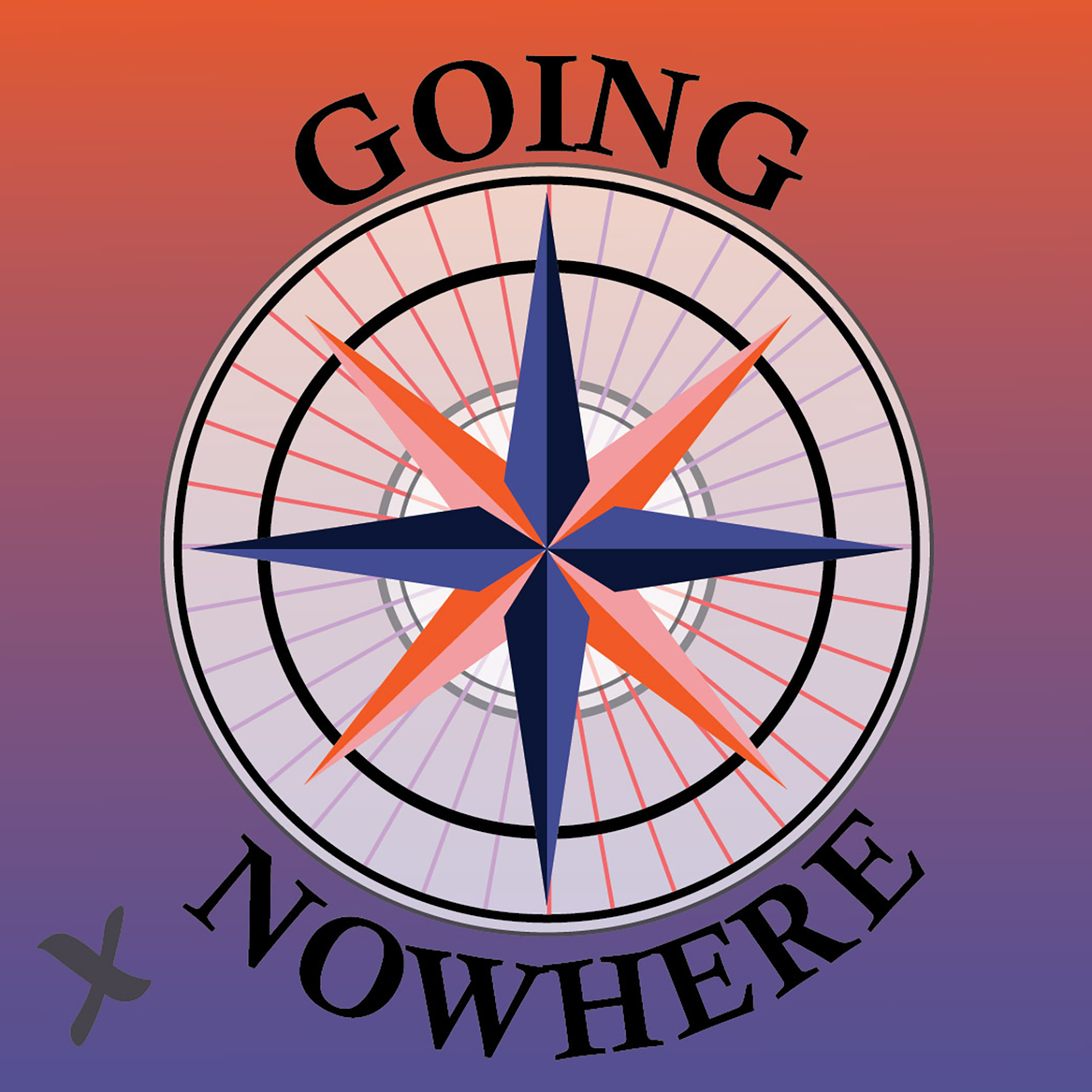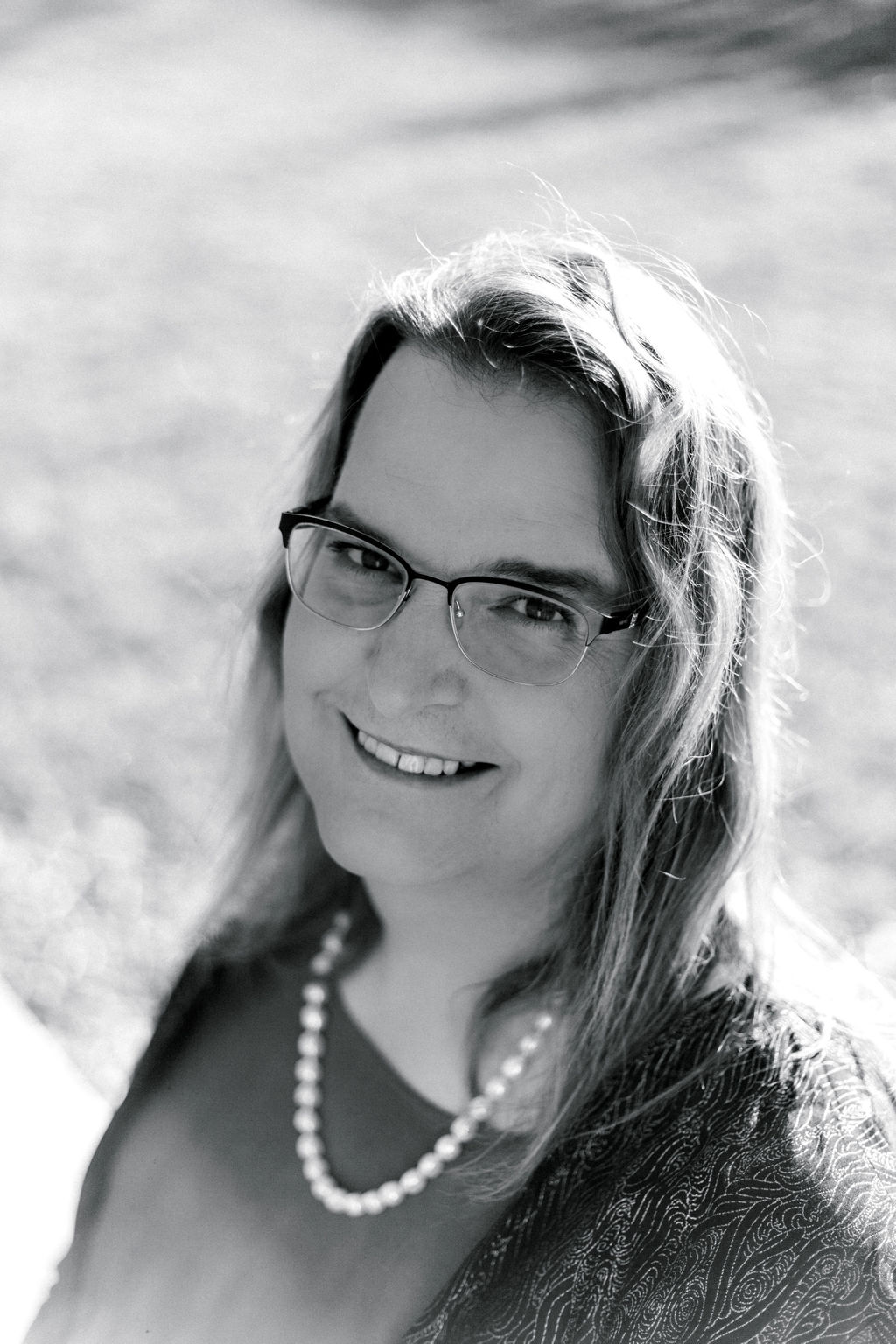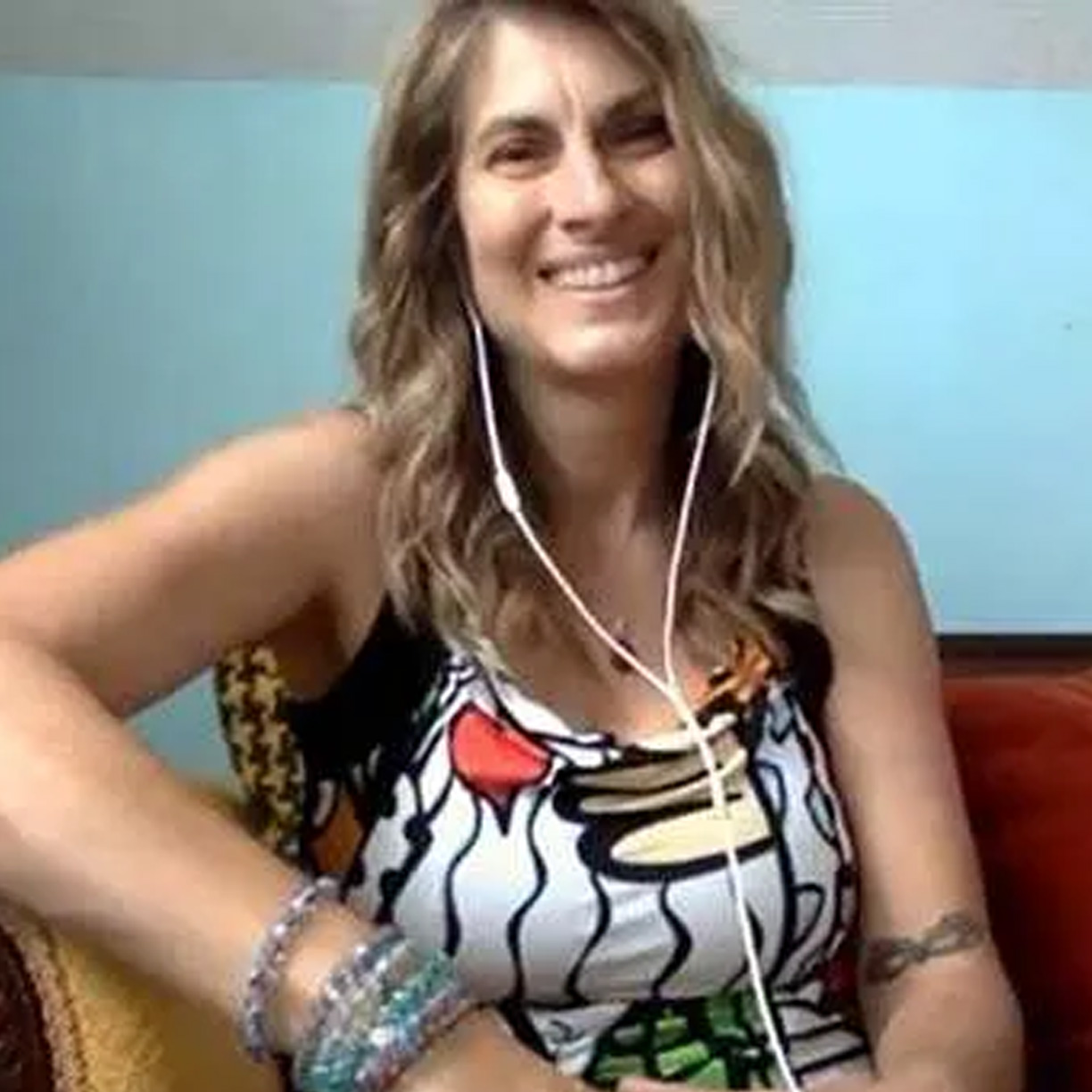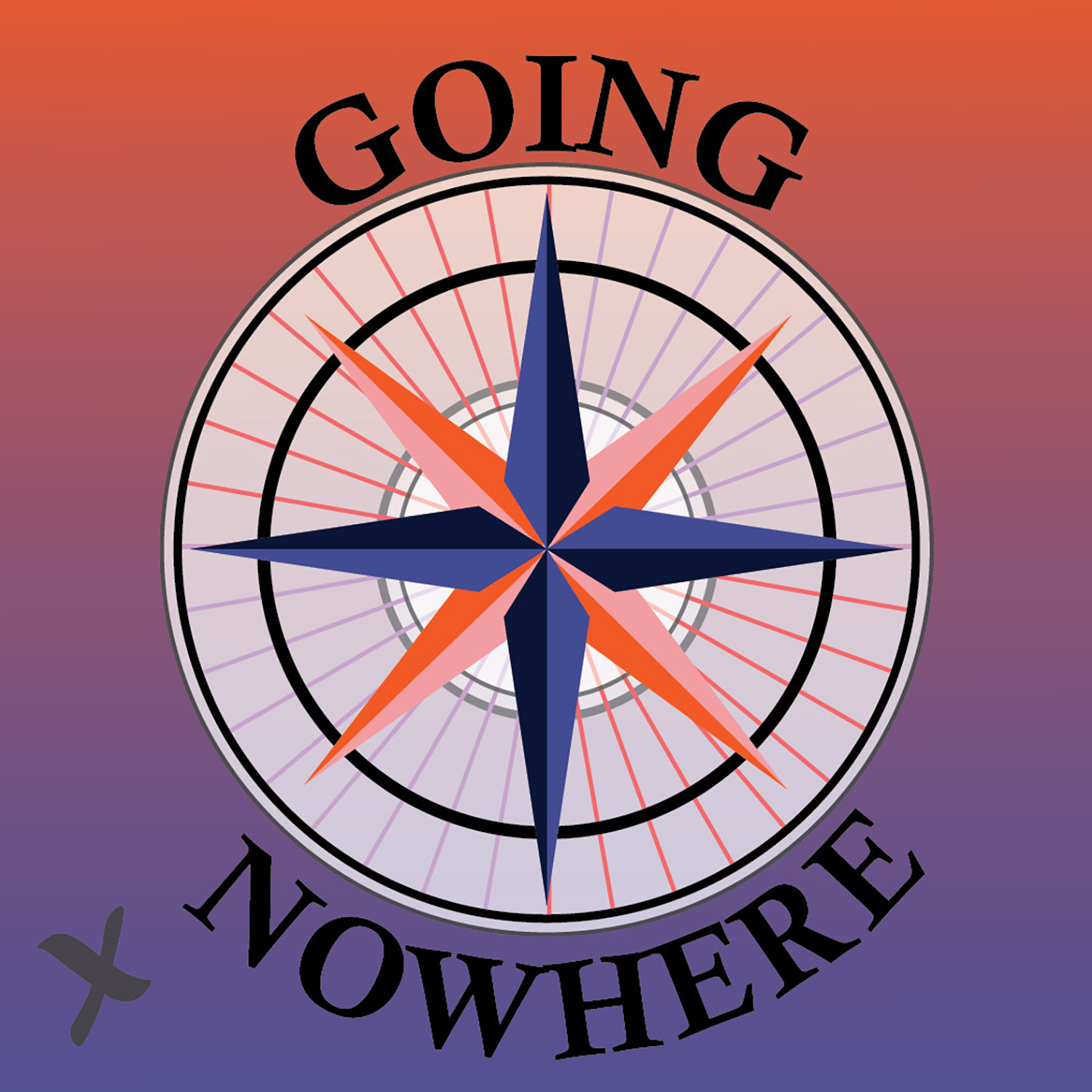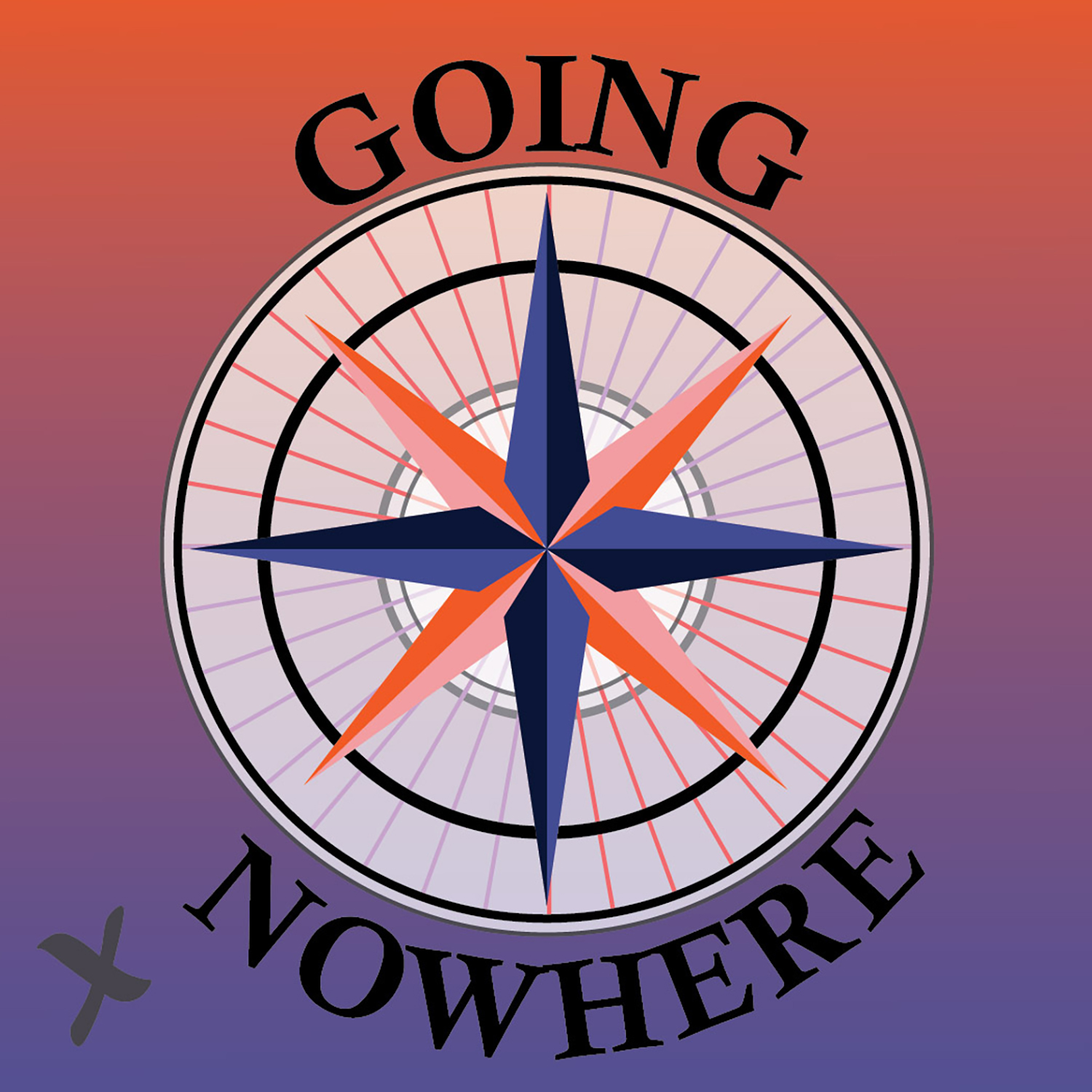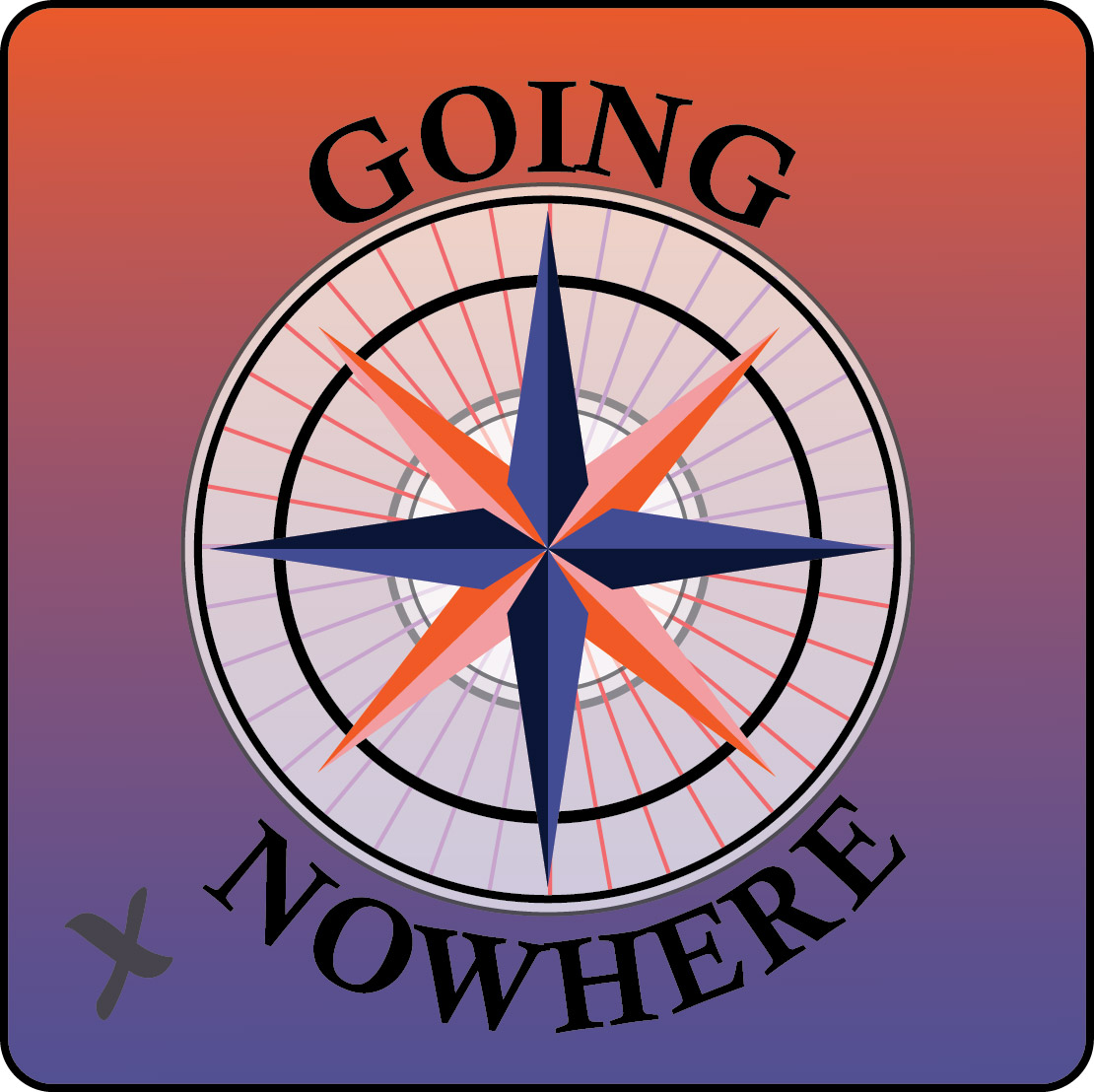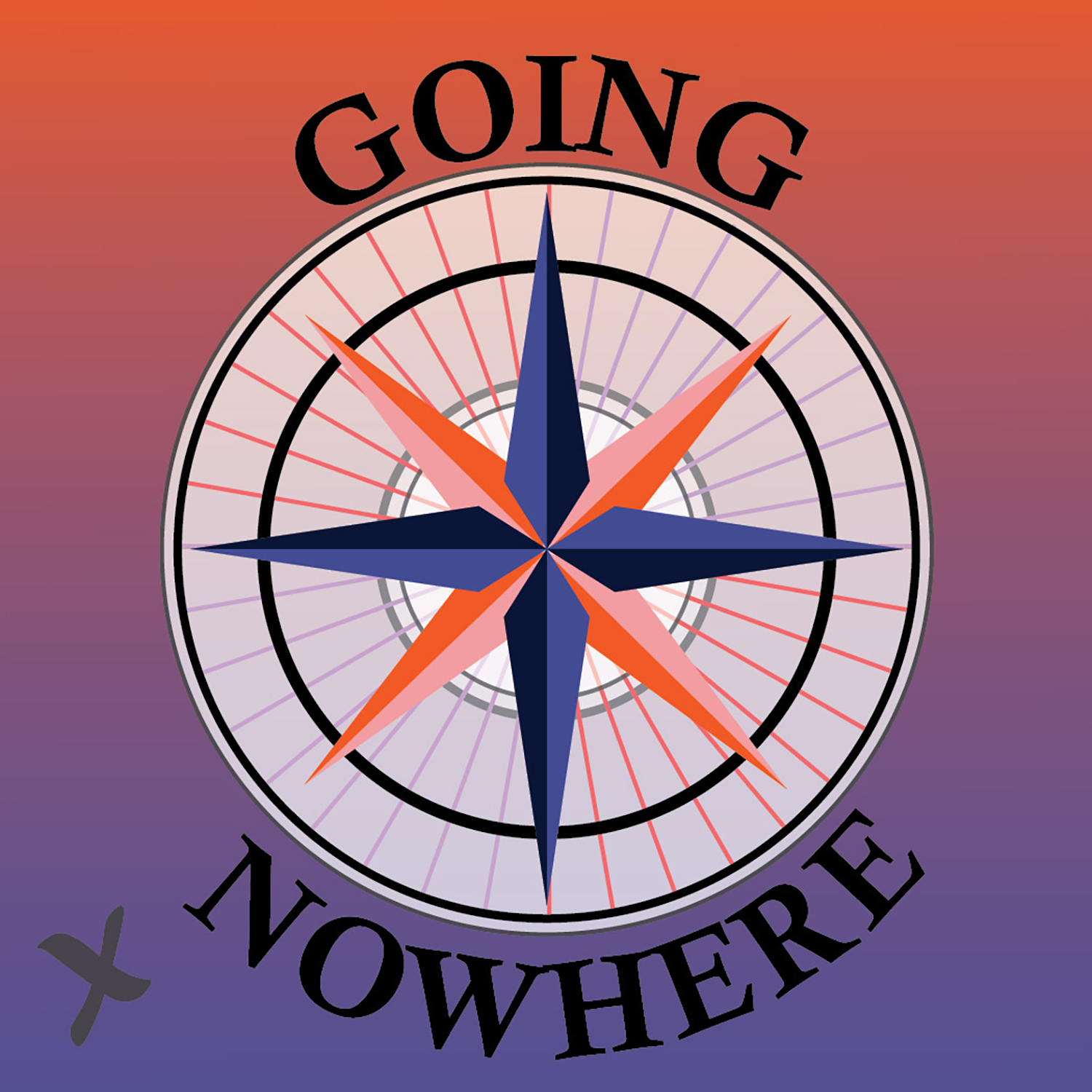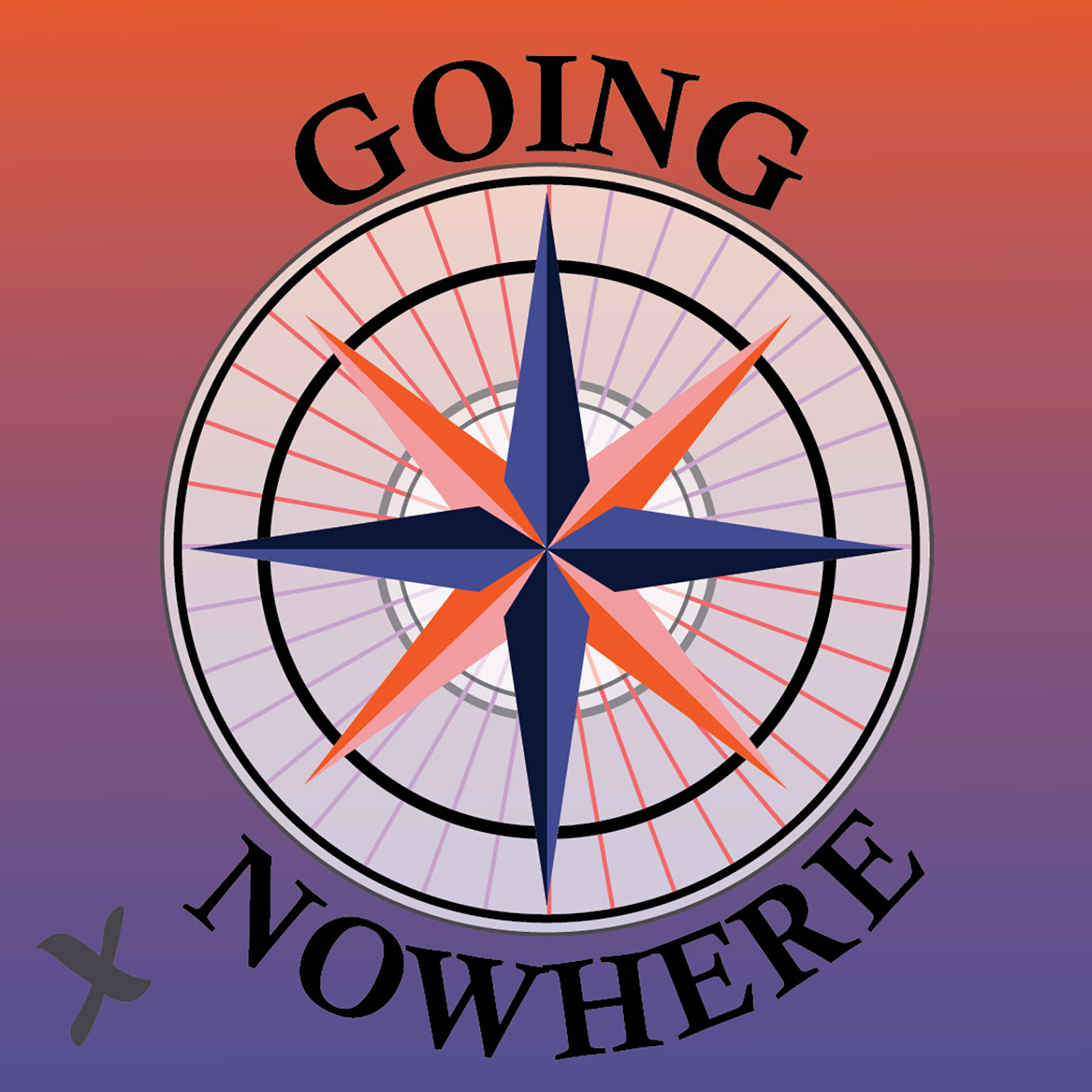Episode Transcript
[00:00:08] Speaker A: Hello.
[00:00:09] Speaker B: Hello.
[00:00:11] Speaker A: How are you, Juniper?
Good, good.
[00:00:16] Speaker B: Well, welcome to Going Nowhere.
I'm Laura Beth.
[00:00:22] Speaker C: And I'm Cynthia Vacca Davis, and I am here with Juniper Parker, my little sidekick and ride or die, little grandbaby.
[00:00:33] Speaker B: That is so fantastic.
[00:00:34] Speaker A: It's so great to have you.
[00:00:35] Speaker B: Juniper, are you having. Are you having a good summer?
Yes. Yes. Okay, I asked you a minute ago, but tell me again, what's your favorite thing so far about the summer?
The beach. The beach.
[00:00:51] Speaker C: You're a beach baby.
[00:00:52] Speaker B: Yeah.
Love a good beach summer. So.
Yeah.
[00:00:58] Speaker C: Because June lives really close to the beach and.
But right now we are recording in Pennsylvania. We're visiting family.
[00:01:08] Speaker B: Okay.
[00:01:09] Speaker C: And there's nary a beach to be found here.
[00:01:12] Speaker B: No. Some mountains, maybe some. Yeah, some east coast version of mountains in deference to our Colorado friends and. But yeah, rolling green.
Yeah, it's beautiful. Beautiful country. So great. Well, it's. It's been a minute since we've got an episode out, but we have a great series coming up here. We have about five episodes in the bank that we're gonna get out.
[00:01:39] Speaker C: Our listeners probably thinks. Think that we've been slacking and that we've forgotten them, but we've been.
[00:01:46] Speaker B: I mean, we have maybe been slacking a little bit. Okay. I have been maybe slacking a little bit because editing has not come as fluidly as. As it usually does. But.
But we have interviewing. We have been interviewing and we haven't worked. We've been scheduling interviews and we've been working, and we both have a lot of great things going on.
[00:02:06] Speaker C: We sure do. But there's been a lot going on behind the scenes, and you're going to start to see some really good content rolling out.
[00:02:14] Speaker B: Yeah, it's been. Been a whole lot of fun. Whole lot of exciting.
Yeah. Two. Two minutes of life check in.
[00:02:23] Speaker C: Yep, I'm down for that.
[00:02:25] Speaker B: Okay. All right, go for it.
Yeah.
[00:02:28] Speaker C: I have been traveling alive. I've hit the peak travel part of my summer.
[00:02:34] Speaker B: Okay. I think our big question is how long has it been since you've been to New Orleans and how long will it be till you go back?
[00:02:39] Speaker D: Excellent question.
[00:02:40] Speaker C: It's been about two and a half weeks since I was last in New Orleans, and I am going back in six days.
[00:02:50] Speaker B: That tracks. Yeah, that tracks.
[00:02:53] Speaker C: I'm going back with a whole cast of characters.
My friends have started migrating with me to New Orleans.
[00:03:02] Speaker B: Okay. All right. You're in trendsetter, you. Yeah, yeah.
[00:03:06] Speaker C: So we have.
We have, I think, five people joining on this trip.
[00:03:14] Speaker B: Oh, that's Amazing. That's great.
Very, very cool.
So, very good.
[00:03:21] Speaker C: So, yeah, so that's what I've been up to.
[00:03:23] Speaker D: What's been going on with you?
[00:03:24] Speaker C: I know you have been busy.
[00:03:26] Speaker B: Busy. Oh, very, very busy.
So. And we'll. We'll talk more about this in an upcoming episode when you do just skip out on New Orleans and come to Indianapolis for a change. Maybe. Yeah, in a few weeks. Yeah, in a few weeks.
[00:03:39] Speaker C: I cannot wait. I am Indianapolis bound in what, three weeks or so.
[00:03:44] Speaker B: Yes. And we'll talk more about this in an upcoming episode. But Flaming Grant coming up here for a concert. And so, yeah, yeah, it's gonna be a great night.
And that'll be the kickoff.
[00:03:55] Speaker D: Friend of the Pod.
[00:03:55] Speaker C: Flaming Grant.
[00:03:56] Speaker B: Yeah, that'll be the kickoff to our new Coalition for Peace and Restoration, which is what has taken all of my time and energy lately.
[00:04:07] Speaker C: Yeah, we're going to have an episode all about.
[00:04:10] Speaker B: All about that. Yeah. And the center for Peace and Restoration, which is all about creating trauma, healing spaces for spiritual trauma and reengaging in personal spiritual development. And. Yeah, just a lot of exciting things for my own journey and for our queer community and in those spaces so.
[00:04:34] Speaker C: Desperately needed at these. These fraught times.
[00:04:37] Speaker B: Yeah.
And something that we get to talk about in the conversation that we're about to share with you that we got to have with Rachel Hall.
[00:04:48] Speaker A: Yes.
[00:04:49] Speaker C: I think Rachel's story is, in many ways, it's going to amplify the need for the work that you're doing, Laura Beth. In so many ways, Laura Beth, you are doing just critical work. And as we listen to Rachel tell her story, I think everyone. I think it's going to bring home those points. Rachel hall is a recording artist.
She was on tour with Flammy Grant last fall, and she was opening for Flamie in the no More Trauma Tour.
And that's how I became connected with Rachel and thought that she would be a wonderful person to have right here at Nowhere in Nowhere. And we're going to spend, oh, I don't know, 45. I didn't edit this. The.
[00:05:44] Speaker D: The episode.
[00:05:45] Speaker C: So 45 minutes an hour, we're going to be hearing Rachel's story. And I really encourage everyone to just go nowhere for just a bit and hear what Rachel has to. Has to say, because it is. It is so important that we listen to these stories.
[00:06:02] Speaker B: Yeah.
Unless you're listening on your commute, then. Then go there.
Proverbially go nowhere. Proverbially. Proverbially. Proverbial. Something Proverbial.
[00:06:15] Speaker C: The proverbial yeah.
[00:06:16] Speaker B: It's the proverbial nowhere. Yes. So feel free to go. Go places while you're going nowhere with us, is my point.
Great.
All right, without further ado, here is Rachel Hall.
[00:06:29] Speaker E: Yay.
[00:06:38] Speaker D: Welcome, friends. We are nowhere today, as usual.
[00:06:43] Speaker B: Absolutely nowhere.
[00:06:44] Speaker D: Absolutely nowhere.
And we're going to invite you to spend the next little bit with us here in Knowhere. We have a special guest today with us in the studio is Rachel Hall.
Rachel is a performing artist who performs under the name Mariella.
I first met Rachel. Actually, I didn't meet Rachel. I first became aware of Rachel last fall when Rachel was on tour with Flamie Grant. And I got to hear Rachel.
She played a marvelous set of music, and I really, really wanted to meet her that night, but it was just a weird night, and I wasn't able to stay to the bitter end and wait in line and introduce myself then.
But I did a few months later over Instagram and got to chat with Rachel a couple of weeks ago.
And now we are bringing her into the studio to talk with us about her work and about some of our themes that we've been digging into this season on Going Nowhere. So, Rachel, would you please introduce yourself to our audience and maybe give us a couple fun facts or things we should know about you.
[00:08:05] Speaker A: Yeah. Thanks for having me on. Excited to be here and get to meet you. Laura Beth and Cynthia connect with you again.
Yeah. Were you, Cynthia, Were you at the Richmond show?
[00:08:17] Speaker D: It was the Richmond show.
[00:08:19] Speaker A: Yeah, that was. That was a. That was a good night, but a weird night for us, too, so.
No. No worries there. Lots. Lots going on.
Yeah. I am a singer, songwriter, and a producer. I produce for a lot of artists here in San Diego, and I still work with a few people remotely that are back in Nashville.
And, yeah, I am a deconstructed former evangelical. I am a queer person, a trans person, and really trying to figure out what it looks like to survive and thrive in a capitalist world that is rapidly becoming more authoritarian by the day and figure out both how to pay my rent and make art that is uplifting and encouraging to my community.
[00:09:16] Speaker D: That's one of the things that we've been talking a lot about this season. I keep almost wanting to say this semester because Professor Brain is this semester we're looking at. But it's the season, whatever the season ends up being.
[00:09:31] Speaker B: We use that term pretty loosely, too.
[00:09:33] Speaker A: So we do.
[00:09:34] Speaker D: We just throw words around. I mean, what does anything mean in these times?
But that's one thing we've been Looking at and talking with our friends and guests about a lot is this moment we're in politically and what it means for people we care about and how we can.
What's the term we've been using, Laura Beth, that we heard at Kew to kind of agitate without being agitated.
[00:10:03] Speaker A: Yeah, yeah.
[00:10:04] Speaker B: So to embrace peace and joy as a path of resistance. Yeah.
In that space.
[00:10:11] Speaker D: Yeah. So how are you. If you are. I don't want to assume that you are, Rachel, but are you finding ways to find peace in these times? And if so, what is it that is. Is helping you to.
To feel that in the. In this moment?
[00:10:30] Speaker A: You know, I think I tend to go from wildly outraged and, you know, filled with despair, and yet the cast of characters that are perpetrating this violence on our country are so ridiculous that it's. It's, like, hard to, you know, everyone's saying, oh, we're in. You know, this is 1934 Germany all over again.
And it's like, yes, I see the parallels, but also, it's so hard to take these people seriously that, you know, Hitler was a good communicator, you know, like a terrible person, but skilled at what he was doing.
And the people that we have, you know, trying to do this authoritarian takeover are so laughable that it's kind of. It's. It's a little bit hard to actually feel like we're on the brink of, you know, falling into a full fascist state. And yet that's easy for me to say because my people group has only been somewhat affected. And if you're a brown person in this country, like, nope, we're there.
And so I'm. I'm having to remind myself that, like, this is not an entertaining news story if you're sitting in a cell in Sukkot right now.
And, yeah, so it's. It's a mixture of outrage and heartbreak and incredulity.
And I think the only way that I am coping is trying to be obsessive about community and leaning into my people and trying to make, you know, art that reflects the moment.
Yeah, it's kind of where I'm at. A couple of.
[00:12:39] Speaker B: A couple questions there.
Tell us about your people.
Where are you finding them? Who are they?
How do you know them when you see them?
[00:12:51] Speaker A: Yeah, I feel very fortunate.
I have a really special community of people in San Diego, and my move to San Diego converged with my divorce and my transition and kind of a full reset of my life.
But what I. One of the many things that I gained is like, female friendship. And as, you know, silly as that sounds, having not, you know, not grown up, being socialized as a woman among other women, it's such an unbelievable gift to have all my friends tell me that they love me every day and be willing and able to, like, sit with me as I'm, like, crying or yelling or, you know, so eager to just, like, rage against the world right now.
I found a lot of my community in San Diego's music scene.
I found not an insignificant amount of it through people that I've, like, gone on dates with and then decided to just be friends with and. And then, you know, being friends with all of their friends.
Yeah, San Diego has been a really special place. I mean, I have a. A group of friends unlike I've ever had before.
[00:14:27] Speaker D: That's so important.
I sometimes overuse the word community because you can't have too much of it. I mean, community has become increasingly important in my life when I was growing up. Different experience to yours, but I found myself not trusting other females.
I was somebody who happened to get bullied a lot in.
In middle school and in elementary school, too, and somewhat in high school. So I didn't trust female friendships. And somehow in the last few years, it has, like you say, it's a gift where I've been able to have these wonderful women come in my life, that I trust them with my life.
And it has really rekindled this sense of.
Or maybe not even rekindled. It's probably for the first time, been this sense of experiencing that female friendship and knowing the power and the just the fierce way my friends will show up for me, and hopefully I for them. So I get what you're saying. It means so much to find your people.
[00:15:44] Speaker A: I know this is like, a whole space of discussion that I haven't really spent a ton of time exploring yet, and it's kind of on my list. But the idea of decentralizing romantic relationships and not, you know, not saying that they don't matter, but saying that they're not the only thing that matters. And especially growing up evangelical, like, finding your spouse was, you know, something that you were taught that your parents prayed for from, you know, the day you were conceived or whatever, that they, you know, they're, you're, you know, righteous marriage partner, blah, blah, blah. And, you know, having gone through that and had it turn out very poorly, I don't. You know, I've been divorced for almost five years now, and I. I don't know if I'll ever have, like, a romantic Partner life partner again. I kind of hope so.
But what I'm realizing is that like we can be in committed relationships with our friends and put their well being on a, on a plane where we put our own well being. Not necessarily above, but I don't know, I've just really learned to value non romantic relationships in a way that I never had before and that's really exciting.
[00:17:20] Speaker B: I resonate so deeply with what you're saying. It's been 10 years for me since my divorce and have recently had a lot of the same epiphanies that there is as much to be gained from these so called platonic relationships that are so much more intimate and personal and some, some trust to be built in them and in those spaces. And I love what you said about decentralizing in the context because growing up in a similar context in the evangelical culture and it was, it was fine to the spouse because those are the. Those the two of you are going to become one and you can't really get on with life until you are one.
[00:18:21] Speaker D: Half an individual.
[00:18:22] Speaker B: Just exactly.
You know, just flailing around in circles because only half of you is working the.
So giving yourself the permission to anchor your wholeness in other than someone else or multiple. Someone else's or multiple spaces. I think it's just, it's a powerful thing that one of those things that I think the queer community is teaching the rest of the world.
[00:19:00] Speaker D: Found family. That concept of found family.
[00:19:03] Speaker B: Yeah.
Around those spaces. So I'm curious is how the flip side of that has that process.
Have you met that process with any grief?
Has there been a.
I mean this is, this is the epiphany side of that. But tell me just a little, I'm just curious a little bit more about the journey to get there.
[00:19:31] Speaker A: Yeah, absolutely. There's been an enormous amount of grief.
You know, even starting with losing my religion. You know, I had an answer for everything. I had this peace and, and assurance about all of the evils in the world and this belief that you know, somehow to someone it made sense and all worked together in, you know, for an ultimate good outcome and losing that sense of assurance.
[00:20:05] Speaker B: Certainty, Certainty and ignorance are both bliss.
[00:20:08] Speaker A: So yeah, yeah, yeah.
You know, I wouldn't trade knowledge for anything. Now that I see the world more clearly, I wouldn't go back. But yeah, there's a certain amount of peace that comes with that kind of certainty that is definitely a loss.
You know, losing trust in my family, my like biological friends, family was such a grievous process. I remember it kind of happened slowly where I went from, you know, going to my dad for his take on everything. You know, I really was raised on this idea of, like, wisdom.
You know, King Solomon was offered anything he wanted, and he chose wisdom instead of riches. And that was like such a. Like, core principle to my identity is that I was supposed to be, you know, constantly seeking wisdom. And I. I went to my dad for that for so long, you know, as this, this righteous man of God. And there came a certain point where we started to have the same end goal, you know, the same thing that we wanted, but really different views on how to get there.
And that was an adjustment.
And then it was the moment when I realized that, oh, actually, this is just total Fox News brain.
I can still see where I was standing so vividly when he told me that the left is trying to take George Washington and Thomas Jefferson out of the history books.
And I was just so shaken that this pillar of knowledge and worldly experience in my life was saying something so ridiculous, you know, like, it just really showed me a peek behind the curtain that was so disturbing.
And that, I mean, that was a fundamental shift.
And then, you know, losing my marriage also, not only my partner, but her family and going from, you know, the holidays and the sense of belonging that I had with them, even in the absence of, you know, before I, you know, came out to my parents, I was. I was still a little bit too off for. For my family. And my. My ex wife's family really celebrated a lot of. Of those parts of me. Um, and so to lose that and to lose this assurance that, like, you know, marriage in my mind was this thing that was permanent.
And that was what was beautiful about it, is it was this relationship where you could be so honest and vulnerable because you had both committed to being there for each other no matter what. And to have my marriage so unceremoniously ended just shook my belief that there was really anything external that I could rely on.
And that was incredibly painful. To just look around and want this sense of validation for a worldview, for anything to say.
This is how the world works, and you can count on it. I couldn't find that outside of myself anywhere. Every source of stability that I had believed in and trusted turned out to be wrong.
And I'm so much stronger now having survived and. And found out that, oh, I actually can live, like, a full, happy and meaningful life without all of those different support structures.
But, yeah, losing. I mean, I really lost all three of those things in a pretty short time.
So Yeah. A lot of grief.
[00:24:35] Speaker B: Yeah.
[00:24:36] Speaker D: There's no way you can lose that much and come out unscathed.
[00:24:43] Speaker B: Yeah. And I mean, I asked the question because I really. I want it.
I related to it. And again, you're telling my story and it's always so powerful to hear it from some of the others perspective. It's unique to you as mine is to me, but there's so much similarity and it's. It's one thing to say it's amazing to be in San Diego or with the community I'm finding here, Indianapolis, and, you know, these epiphanies that we're having about decentralizing romance and, you know, embracing and celebrating friendships. But.
But it's been a journey.
It's been a lot to get to that moment. And it's so much more, you know, I.
I feel it so much more deeply on your behalf, knowing as a trans woman, what.
What it takes to get there sometimes, so.
[00:25:49] Speaker D: And Rachel, I know from our conversation that we had a couple weeks ago that your song Mariah is really important to you and to your story and kind of honors that journey, and I was wondering if you could talk about that a little bit.
[00:26:05] Speaker A: Yeah, absolutely.
Yeah. It's a song that I wrote about the story of Abraham offering to sacrifice Isaac on Mount Moriah.
And the way that it was taught to me as a child was that Abraham was, you know, upright and faithful and, you know, to be praised for loving God more than anything else, including his own child.
And then that God was also supposed to be praised for being so merciful that he provided, you know, an alternative sacrifice and. And did not actually require that. That sacrifice. And we just kind of lose sight of the fact that.
Okay, but we're still talking about a God who ordered child sacrifice and a father who was willing to perform it like that is so unbelievably fucked up.
Full stop.
[00:27:06] Speaker B: Full stop.
[00:27:07] Speaker A: Right?
[00:27:10] Speaker B: Do you mind if we play a clip of it?
[00:27:13] Speaker A: Oh, sure.
[00:27:16] Speaker E: I hear you calling my name.
[00:27:20] Speaker B: On.
[00:27:20] Speaker A: The bottom of the stairs.
[00:27:24] Speaker E: But I'm tangled up in clothes that I know I shouldn't wear yeah, you like me with short hair. You send me to school in my uniform study. And the king who could call the stone storm Talk about miracles but what am I if I gotta hide if I gotta hide who I am.
[00:27:51] Speaker A: Take.
[00:27:52] Speaker E: This child to the mountain by the hands that be too high Raise the night the heart is mountain till my head and cry as we this.
[00:28:31] Speaker A: How.
[00:28:31] Speaker D: What is the pain parallel with that story and with your journey? Because I know, I know that you connect the two.
[00:28:40] Speaker A: Yeah, I mean, I think it is the perfect illustration for what evangelical parents think that the Bible is calling them to in regards to their queer children is sacrifice your child to God in order to both please God and save the child.
And, and I mean, it's just.
It is so tragic when I think about my dad lying awake, praying night after night, praying for me, praying for me to come back. You know, he.
Last summer, he mailed me a Father's Day card that I had written to him when I was 21, and he said that it was one of his most prized possessions and it was me, you know, kind of extolling and praising him for being the spiritual leader of our household, because that is, you know, the viewpoint that I had back then.
And he said he wanted me to hold on to it and return it to him when I returned as his son.
And I mean, just, just an unbelievably painful note to receive.
And yet I know for him, you know, he believes that he is doing this righteous thing by torturing himself rather than accepting me.
And I, I, I am a victim. But I'm not the only victim in that story, because I just look at the heartache, you know, my. I. Cynthia, I can't remember if I told you this story when we spoke on the phone a few weeks ago, but out of nowhere, at the end of last year in December, my mom asked to come visit.
And it was the first time either of my parents were going to, like, really see me since transitioning. And, you know, to that point, they had never called me Rachel. They had never used correct, you know, pronouns or gendered language with me.
And she said, I want to come. Like you be your full self. Like, I just want to see you.
And I was overjoyed. Well, she, she asked, she said, you know, you mentioned me coming to visit. You know, is that offer still open?
And I said, yeah, like, yeah, I can't pick you up at the airport tonight. Like, when do you want to come?
And she ended up coming first week of January, and it was one of the happiest weeks of my life.
We had the, like, mother daughter experience that I have, only, like, it was beyond my wildest dreams.
We had so much fun, and we laughed and we cried. And, I mean, I remember laying my head on her shoulder and her calling me baby girl and just saying, I didn't get it until I came out here and saw you. And now all I see is a woman. Like, it just makes sense to me.
I couldn't imagine how Your community would actually, like, accept you and treat you as a woman. Until I saw it.
And since she went back home to Alabama, she has fully reverted and. And actually forgotten, like, made herself forget. She says she doesn't even remember calling me her daughter and that she came, you know, but she, like, wasn't trying to be confrontational. So, like, she didn't bring up her differing opinions. And, like, she's rewritten the story in her mind to make it easier to exist back at home in Alabama with my dad and the rest of my family and their church community.
And I'm obviously heartbroken. I mean, I remember our tearful goodbye at the airport just embracing and, you know, me saying, like, please don't forget. Like, I already saw this as a possibility.
And, you know, one of the things she said when she was still with me one night, we were about to go to sleep, and she said, you know, you are my daughter and that's how it is now, and your dad and your sisters will just have to figure it out.
And she doesn't even remember saying it.
And, you know, we. I took Polaroid pictures of us and I took two at every. Every. Every pick we took so she. So I could send her home with one of each moment.
And, you know, she texted me a couple weeks ago and said, hey, you know, I found these pictures in my closet and I remembered what a good time we had. And, you know, I'm so sorry that you feel like you lost me all over again. That wasn't my intention.
You know, can we just try to pick up and, you know, keep building our relationship?
And I said, yeah, like, I.
I want to have a relationship with you, but, like, you not acknowledging, like, the fundamentals of my existence, like, that will always hurt. And like, And. And she said, she said in her message she just worries about how hard life is going to be because of my decision to, you know, to live as a trans person. And I said, you came out here and you saw that life doesn't have to be hard because you saw how much my community and the. My city, the world around me accepts me.
But you are actively a part of a coalition that is trying to make my existence as hard as possible.
And I'm asking you to join me on the other side and fight for equal place for not just trans people, but for all people groups.
And she just said, you know, oh, you make some good points. And we haven't talked about it since.
And so, yeah, I mean, it's just. It's sad that we had such a Beautiful renewal and the start of a new relationship. You know, it was like the beginning of a mother daughter relationship as opposed to a mother son relationship that, you know, we had and lost.
And just to see her sacrifice that, like I said on. On Mount Moriah, on the altar to an imaginary God, that not only.
Not only is it not a requirement to be a Christian to disavow trans people, there are tons of people that still believe in a Christian God and a Jesus Messiah and the cross and all of those things who read the Bible to be affirming of trans people.
And. And so it's just so tragic to me that they are forcing themselves to go through this sorrow and heartache at how I turned out and the separation, all because they think that God, you know, made me as a man. And, you know, there. There are plenty of interpretations of the Bible that. That make room for who I am.
And.
[00:36:42] Speaker B: Absolutely.
[00:36:42] Speaker A: It's just so such a tragic loss for them.
[00:36:50] Speaker B: Yeah. Thank you so much for sharing those pieces of your story. And as you were telling the story of your. As you were telling the part of the story of your mom being in San Diego, I was in the back of my head saying, please have a happy ending.
[00:37:03] Speaker A: Please have a happy ending.
[00:37:04] Speaker B: Please, please let that arc continue.
And I've known stories where it does, but so often we hear the narrative that you just described where it's. They see it in a moment, but they have to fit in a world that doesn't make sense.
[00:37:25] Speaker A: Yeah.
[00:37:27] Speaker B: On that front. And it's hard to watch, it's hard to experience, and it's hard to watch. And I'm not. I don't want to take for granted asking you to relive it and in this space. So thank you for.
[00:37:41] Speaker A: Yeah, I wish it had a happy ending. And, you know, they're not dead yet, so maybe they're right.
[00:37:49] Speaker B: It. It's not. There isn't an ending yet.
[00:37:52] Speaker A: I told her in that text, which was, you know, the last, like, serious conversation we've had. I said, come visit. Come remember what you've chosen to forget, and that invitation will always be open.
And so, you know, maybe. Maybe there's a happy ending somewhere out there, but right now, they're choosing to live in a really sad place.
[00:38:25] Speaker B: Yeah.
[00:38:26] Speaker D: What I'm hearing in this story is a lot of ambiguous grief where there's not really closure.
It's kind of open, and so the grief is there.
But that little bit of hope.
Hope can be wonderful and hope can be heavy at the same time, and that's I think what.
What living with ambiguous grief is like.
[00:38:56] Speaker A: Go ahead, Larva.
[00:38:57] Speaker B: Go ahead, Rachel.
No, I was just going to name that. I think back to your. The word you used to decentralize.
And as much as the spouse is centralized in that culture, in that narrative, the nuclear family, the family of origin is centralized. And so, you know, I was sitting here asking myself, how is. How is Rachel? Okay, as this nuclear. As that family of origin is disrupted and is not the.
The not what it originated to be? And. And you've already told us the answer is that you have decentralized, that you have found a new, broader center for your identity, for your self awareness and your social acceptance, etc. So, yeah, just.
[00:40:01] Speaker D: There's so much richness in that, in that ability to recreate a narrative for yourself too, which is what you've done very successfully. And I think a hopeful part of that is. I'm thinking of the story that you did share with me when we talked last about what you portray on social media and how that's portraying yourself as somebody who is living a full life and making music and making art and the encouragement that that has been to people who are following you.
And I think that's maybe that's the hopeful arc where you have learned to show up for yourself and for the people who are watching you.
And I was wondering if you could maybe share a little bit about that.
[00:40:54] Speaker A: Yeah, um, all people want to talk about are the, you know, trans suicide rates. And I think when all you're told is that you are embarking on this sad, lonely, isolated life, it's really easy to think, think. I don't. I don't know if I can do this, if I should do this. Like, I remember the. The Internet is full of people trying to figure out their transness.
And once most people figure it out, they kind of retreat from the Internet and just live their lives.
And so if you're looking, you know, contrary to the popular media narrative, like, there's actually not that many of us, like, we're. We're not a huge part of the population.
And so I didn't really know any trans people in real life. I knew one at the time. And she was also early on in her transition and trying to find herself. And, you know, about the only thing we had in common was the fact that we were both trans, or at least that I was, you know, considering my gender identity.
And so there was just very little for me to look at in the way of, like, somebody happily living a full life.
And I just Think, like, you know, when I, when I found Contrapoints, you know, like, every, every trans person knows Contrapoint. Not everyone, but she's a very popular content creator. And I just thought, wow, here's a, here's a girl who's so smart and making really engaging content, really has a provocative view of the world. And I thought, okay, well, there's a, there's a trans person who's doing something that, like, I can kind of think, oh, I wouldn't mind that life. Like, she's cool.
And I didn't know that many others. Like, it was a really, really short list.
And so initially I was, you know, I kind of pushed back from the personality of, like, oh, you know, trans. Trans is my personality. It's my whole identity. Like, I didn't want to be like that.
And so I, I really leaned away from, from putting my trans identity front and center with my creative public Persona. And then I just realized that, like, I needed to see me four years ago, desperately. I wish anyone could have introduced me to somebody who, you know, has an apartment and a job and is creative and has friends and is living their dreams. And so now it's incredibly important to me to bring all of that to the Internet and to shows and to every part of my life. Like, I want people to know, happy trans people are just out here living our life. You know, like, if you leave us alone, we can just be happy.
[00:44:17] Speaker B: Yeah.
[00:44:18] Speaker A: And so, yeah, that is hugely important to me to be a representation both for the trans community, but also for the wider CIS community. To say, kind of like my mom saw when she came to visit, like, oh, this isn't at all what I pictured. You're just living your life like every other woman in your friend group.
And that is a message that needs to be shouted from the rooftops. And so as much as I can bring that to my music and, and public presence, I really want to.
[00:44:53] Speaker D: Yeah, I think that that is, you know, it's a brave thing to do, and it's a selfless thing to do, to put yourself out there with that thought in mind of, hey, there's somebody that's going to need to see that. So I think that's, I think that's important work in of itself.
[00:45:14] Speaker B: Absolutely. And I, again, resonate so much with what you're saying. When I, you know, came out 10 years ago, the, the goal, the, the big conversation, especially among older trans people, was passing. Everything was about passing and then blending back into society. And so we didn't have the narratives because the goal was to, to write yourself out of the trans narrative and into the culture. And it's.
I appreciate so deeply in the past 10 years, the past five, six years in particular, more and more of these ident. More and more people like yourself who are willing to say, no, this is, this is who we are. And we're, we're okay. We're beyond okay. We're even, we're thriving because that's what authenticity does. And.
[00:46:12] Speaker A: Even, even that it can be both in a certain sense, like I am, you know, I'm, you know, on my own journey of letting go with, of the obsession with passing. I mean, I think we all struggle with that, but I do pass in a lot of situations and I'm thankful for that. That makes me feel safe and adds an ease to my life. But I am also still very public about my transness. And I want, I want the narrative to be that transness can be celebrated and public, while also you're not that different from any other CIS women and you can just be the, you know, just another girl in the group.
And yeah, you don't have to hide your transness or deny your transness to not let your transness be a constant differentiator.
[00:47:16] Speaker B: Yeah.
Wow, what a roller coaster of a conversation.
[00:47:26] Speaker D: Such vulnerability. And I appreciate that, Rachel. I think that that's going to speak to a lot of people. Your, your willingness to be vulnerable and, and to share from your heart. And I'm so grateful that you were generous with your story.
[00:47:41] Speaker A: Yeah, I hope that it, I hope that it is an encouragement to people. I wanted.
I, you know, I think one of the first people that I came. Came to was Alok, as so many people do, and their reality is so beautiful and their mind is so beautiful and the way that they communicate. And also I remember because there, there was a big part of me that was like, well, maybe I can do non binary. Like, is that more acceptable? Will my wife not leave me if I'm non binary?
And I just remember kind of beginning to consume their content and thinking, oh, this doesn't quite feel right. This is not how I'm experiencing it.
And so the more that everyone can show up because we need all different ways of expressing the trans identity.
It doesn't, everyone doesn't have to do it like me, but for those people that look at me and say, oh, that's like, that's kind of how I feel.
I want, I want to be available to them.
[00:48:57] Speaker B: And give us just a glimpse of what's coming up in your world. Any projects Any.
[00:49:01] Speaker A: Yeah, I've got a new single coming out any day now. We're.
We're waiting to see if the guitar player that we usually work with is going to get back to us or if we're just going to have to release it without.
Without guitars on it.
But it's a. It's going to be the last single off of my upcoming record.
It is a retelling of the Don Henley song the Boys of Summer.
So it's kind of a cover.
Technically it is a derivative work, which is complicated for copyright reasons, but we're just gonna hope for the best.
Yeah.
Girls of Summer.
And at least in my experience of it, it is about two girls at summer camp and a romance that one of them is ready for and the other one is not quite there yet.
And the pain and the confusion of summer ending and, you know, one person feeling the pressure to.
To go back to conforming. And yeah, it's. There's just honestly a couple subtle lyrical tweaks, but that, that is what it expresses for me now. And so that could be out as soon as next week and then will be a full length record that includes Mariah in August.
[00:50:37] Speaker B: Awesome. See. See also every crush I've had in the last 10 years. So. Yeah, yeah, thanks.
Thanks for that. Memory.
[00:50:49] Speaker D: Art is supposed to be relatable.
[00:50:52] Speaker B: Yes, yes, I'm aware.
Good. Well, I am going to steal Cynthia's thunder a little bit.
[00:51:03] Speaker D: Are you taking the last question?
[00:51:05] Speaker B: Taking the last question.
[00:51:06] Speaker D: Oh, go for it.
[00:51:08] Speaker B: So a question Cynthia has. Has taught me to ask. And since you all have already had a conversation, she might have already asked you the question. But is. Is there anything that you thought we were going to ask or that you were wishing we would ask that you're just dying to talk about that we did not know to ask or didn't think to ask? Ask.
Yeah, I was really. I was kind of afraid to ask the question because like she's going to take me on some. Another emotional dive or fly and. Yeah.
[00:51:50] Speaker D: Side quest that we weren't prepared for.
[00:51:53] Speaker B: Crap. Rachel. I don't know how much more we'll do another episode and compare ourselves.
Yeah, no, that would be.
[00:52:10] Speaker D: Rachel shared about this much of it in Richmond, so during the show.
[00:52:28] Speaker B: Yeah, yeah, no, there's, there's. There's another episode in here somewhere. So. Great. Look forward to. Forward to that happening and yeah, yeah, maybe after your album comes out.
That would be a lot of fun. So.
Good. How did I do?
[00:52:44] Speaker D: Stuck with us now.
[00:52:45] Speaker B: Yeah, no, you're part of the family.
Sorry for. Sorry for your luck.
[00:52:51] Speaker A: Yeah.
[00:52:52] Speaker D: These are the cards you drew.
[00:52:54] Speaker B: Yeah. There's family that you choose, and there's family that chooses you. And, you know, you're a friend of the pod. You kind of gotta. You kind of gotta roll with it. So how did I do with the question, Cynthia? Did I do it?
[00:53:05] Speaker D: You did great.
[00:53:06] Speaker B: Okay, good.
[00:53:06] Speaker D: You did great.
[00:53:07] Speaker A: I love it.
[00:53:07] Speaker B: I try and be a good student.
[00:53:10] Speaker D: I love it. I wish my. My journalism students were as good at picking up on this.
[00:53:17] Speaker B: Yeah, well, have them call me. I'll set up straight, so. Great. Well, Rachel, thank you so much for your time and your investment and your work and sending out with good vibes.
Yeah. Look forward to seeing.
[00:53:51] Speaker E: Empty Shoulder.
The sun goes down alone?
I'm thinking about your face Wondering if you're home But I can see you blowing bubbles in the sun Baby, I still smack you in that blanket Be late until dawn after the girls of summer have gone.
[00:54:26] Speaker B: It's a clip from Rachel's new single, her take on the Don Henley classic Boys of Summer.
You can find Rachel's music everywhere. You stream music and you can find us everywhere. You listen to podcasts, so be sure and give it a like or share. Thanks for joining us for another episode of Going Nowhere and look forward to having you back with us again soon.
[00:55:00] Speaker E: Now I don't understand what's different about our love.
Babe, I'm gonna have your back.
[00:55:08] Speaker A: Love ain't nothing to be afraid of I can't see.
